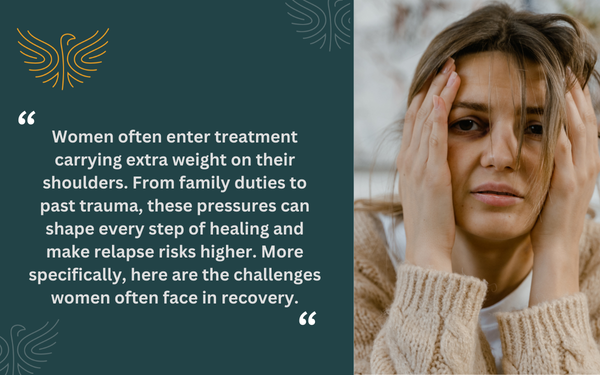Many women juggle multiple roles at once, such as child care, jobs, and family duties. Some also carry hidden scars from past abuse or trauma, which can make cravings stronger and trust harder. Hormone changes, pregnancy, and even monthly cycles can further affect how your body reacts to drugs, alcohol, and treatment medicines.
In this article, we examine the hurdles that many women meet on the road toward healing. The truth is there isn’t a one-size-fits-all approach, and, as women, there are unique roadblocks that need to be acknowledged for healing to take place.
_______________________________________________________
What Challenges Do Women Face in Recovery?
Women often enter treatment carrying extra weight on their shoulders. From family duties to past trauma, these pressures can shape every step of healing and make relapse risks higher. More specifically, here are the challenges women often face in recovery.

Childcare and Family Duties
Many women in recovery are also moms, and childcare can be a significant hurdle, including the financial stress of finding a provider while you get the help you need. Additionally, you may worry about losing custody or about who will watch the kids during a clinic visit. And the unfortunate truth is that very few treatment centers provide on-site play areas, and even fewer let children stay overnight.
On top of this, when a therapy group clashes with the school pick-up line, therapy usually loses. Because of these gaps, women may leave programs early or skip them altogether.
Trauma and Past Abuse
Roughly two out of three women in treatment report past physical or sexual abuse. And these old wounds can spark strong cravings, nightmares, and panic, making sober living that much harder. Loud group rooms or male-led sessions may further feel unsafe and trigger flashbacks, causing some women to walk out.
As such, trauma-informed care is important. This involves quiet spaces, staff trained in gentle language, and therapy that honors the past. Safety and respect are paramount when it comes to finding the right support and environment to work through trauma that’s tangled with substance abuse.
Shame, Stigma, and Social Judgment
Women who use drugs or alcohol often face harsher judgment than men. They may be labeled “bad mothers” or fear neighbors will gossip if they ask for help. This shame pushes many to hide bottles, skip meetings, or lie to doctors. Breaking the silence takes supportive voices—friends, partners, and health workers who speak without blame. However, this hurdle alone can prevent many women from getting the help they need and deserve.
Hormone Changes and Physical Health
A woman’s body changes across the month and across a lifetime. And these changes have varying impacts on recovery. For instance, estrogen heightens the brain’s reward response, meaning cravings can peak during specific phases of the menstrual cycle.
Research also shows women can relapse faster after quitting nicotine or stimulants. Pregnancy, menopause, and smaller average body size can also all alter how a drug is absorbed, raising the risk at lower doses. Thus, during recovery, women’s hormones and cycles should never go ignored.
Mental Health Concerns
Women with substance use disorders have high rates of anxiety, depression, and post-traumatic stress. Sad or worried feelings can fuel late-night drinking, and alcohol or pills can deepen those same moods the next day. This makes relapse more likely if only the drug use is treated. Thus, combining talk therapy, safe medicines, and peer support that address both mood and substance use gives women a better shot at long-term wellness.
Money, Work, and Safe Housing
Lower pay, caretaking jobs, and gaps in health coverage leave many women with little cash for rehab. Some also face unstable housing or must flee unsafe partners, making daily sobriety even harder.
Without a safe bed or steady income, keeping doctor visits or buying medications can feel impossible. But the good news is that there is hope.
_______________________________________________________
How Women in Recovery Can Overcome These Challenges
Overcoming these barriers starts with care built specifically for women. Gender-responsive programs keep groups small, use calm rooms, and train staff in gentle language. These steps help women stay in treatment longer and stay sober after they leave.
Family-friendly services also remove another wall. Centers that let mothers live with their children or offer on-site daycare see higher success rates and fewer custody losses.
Additionally, a strong community, such as sober parenting groups, women-only recovery meetings, and ongoing counseling, guards against relapse long after rehab ends. If you—or a woman you love is struggling, remember, getting help early can save lives. At Freedom Recovery Centers, we’re here to help meet your unique needs, giving you the best shot at recovery and healing. Call 804-635-3746 to take that first step today. With us, there’s no shame; just support and help when you need it the most.
.svg)


.png)



.svg)

.svg)



.svg)
